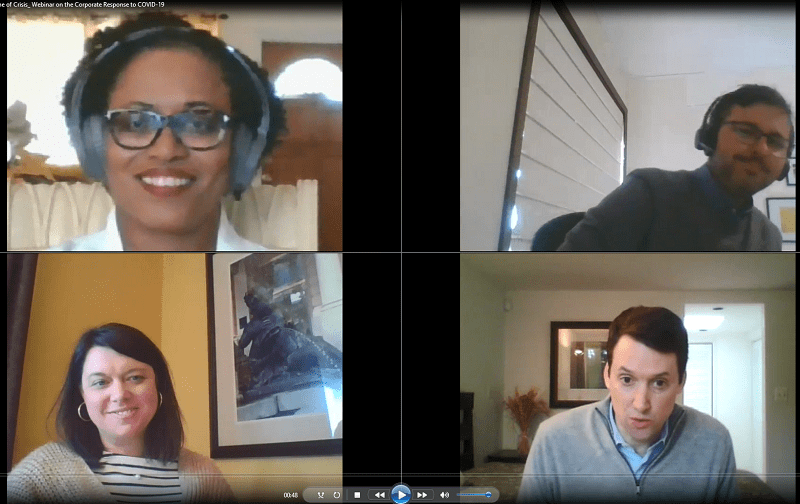In my current role at FSG, I provide thought partnership to business leaders on the most effective ways to create social impact. I rely on our two decades of experience in this space as well as best practices I see in the field.
To keep things real, I often remind myself of my prior role when I was an in-house CSR manager of a company and ask myself what I would do in that position. Since the outbreak of COVID-19, however, I have found myself wondering how I would respond now, when there is no roadmap, and we are in uncharted territory.
On March 30, Lynette Bell, President of the Truist Foundation, Julie Gehrki, Vice President of Philanthropy at Walmart, and Michael Stroik, Director at 3Mgives and Vice President of 3M Foundation provided a glimpse of a new and emerging roadmap to address the COVID-19 crisis during a webinar with FSG’s co-CEO Greg Hills.
They shared with more than 500 corporate, nonprofit, and academic leaders what they are learning as they lead their organizations in response to the crisis. Their overarching message was that of learning, collaboration, and trust.
Here are five practical lessons I took away from this webinar:
- Respond to immediate needs first: Truist, the sixth largest financial institution in the U.S., has planned a comprehensive set of responses in phases. The company made a decision to prioritize basic human needs first, i.e., real challenges experienced by employees, communities, and clients. Through the $25M Truist Cares initiative, the company plans to begin by responding to the short-term needs of specific segments, such as senior citizens and small businesses. Simultaneously, the foundation is thinking about how to address long-term systemic change through its grants.
- Dig into your core, cross-functional expertise: 3M has leveraged its surge capacity—built nearly 20 years ago during the SARS outbreak—to double its production of N95 respirators. Core expertise need not be related solely to your product. Out of the 35 million respirators that 3M is producing per month in the U.S., more than 90% are designated for health care workers—thanks to internal stewardship by the company’s government relations department. Similarly, Walmart was able to leverage its foundation’s disaster relief framework as it developed its own response to COVID-19. The disaster has forced companies to bring cross-functional expertise to create social impact.
- Think creatively about partners: 3M and Ford are partnering to increase the production of 3M’s powered air-purifying respirators, which will use off-the-shelf components from the automaker’s F-150 truck’s cooled seating, as well as 3M’s existing HEPA filters. These respirators could potentially offer significant advantages in use compared to N95s, since they are battery-powered and can filter airborne virus particles for up to eight hours on a single, swappable, standard-power battery pack worn at the waist.
- Proactively address the impact on the most marginalized: There is significant evidence that COVID-19 has disproportionately negative impacts on certain sub-groups such as women and people of color. Truist is proactively relying on datasets from partners like Johns Hopkins to understand where the pandemic is growing and which neighborhoods need the most support. Panelists spoke about how equity consideration is a muscle that needs to be continuously developed, that is there is no better time to embed equity in your work than now.
- Stay real, be nimble, keep learning: I personally loved this one. Panelists spoke about how they are problem-solving every day to ensure that responses are grounded in reality—whether about how to increase production of masks or how best to ensure retail customers maintain social distancing. Many of the ways that Walmart is responding are informed by ideas raised by associates on the ground and staff from different parts of the company.
My most enduring sentiment coming out of this conversation is that social impact leaders must continue to share and discuss what they are learning. This crisis is going to require us to stay real, creative, collaborative, and empathetic.
Learn more about FSG’s Corporate/CSR work >

